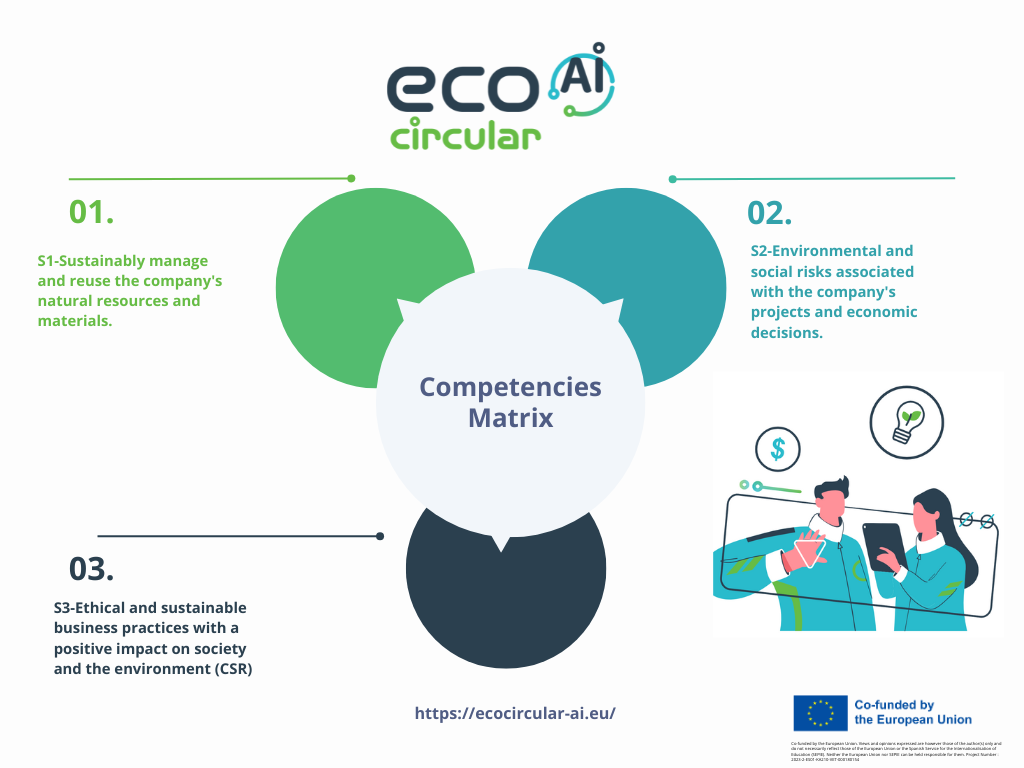Resources

Competencies matrix
S1 : Sustainably manage and reuse the company’s natural resources and materials
Description
This learning unit focuses on the efficient use and reuse of natural resources such as water, energy, and raw materials within a circular economy framework. It supports the development of skills to control costs, reduce consumption, and apply sustainable practices in materials management.
Essential Competencies
KA1: Analyse and control the costs associated with circular economy initiatives
- Understand the economic impact of circular actions.
- Evaluate return on investment of resource-saving strategies.
Learning Content:
- Circular economy costing techniques
- Return-on-investment (ROI) analysis
- Life-cycle costing for materials and energy
Evaluation Criteria:
- Cost analysis report comparing traditional vs. circular processes
- Justification of investments in eco-innovation
- Use of financial KPIs for circular economy
KA2 : Contribute to the preservation of natural resources such as water, energy and raw materials
- Identify opportunities to minimize resource use.
- Support energy, water, and raw material efficiency across processes.
Learning content:
- Best practices for eco-efficiency and clean production
- Introduction to energy and water management systems
- Resource preservation through innovation and smart technology
Evaluation criteria:
- Resource-saving plan for a company process
- Audit of water/energy/raw material usage
- Proposal for implementing circular resource flows
ESCO Alignment:
- Skill: Manage financial and material resources
https://esco.ec.europa.eu/en/classification/skill?uri=http%3A%2F%2Fdata.europa.eu%2Fesco%2Fskill%2F1ddc021d-d818-4731-904f-842d7491f419 - Level: Practitioner
S2 : Environmental and social risks associated with the company’s projects and economic decisions
Description
This learning unit addresses how business activities and economic decisions can generate environmental and social risks. Learners will develop the ability to identify these risks—such as pollution, biodiversity loss, climate change, and inequality—and understand how legal and ethical standards guide companies in reducing or managing their impacts.
Essential Competencies
K1 : Identify and assess the impact of factors such as pollution, biodiversity loss, climate change and social aspects
- Detect environmental and social impacts caused by business operations.
- Evaluate risks using sustainability indicators and scenario analysis.
- Analyze how business activities contribute to global challenges.
Learning content:
- Environmental and social impact assessment
- Sustainability indicators (e.g., SDGs, ESG metrics)
- Biodiversity, climate, and pollution risk analysis
- Stakeholder and community risk mapping
Evaluation criteria:
- Analysis of the impact of a business project
- Application of environmental and social KPIs
- Risk matrix with stakeholder perspective
K2 :Understand regulations and ethical standards related to sustainable resource management
- Interpret relevant environmental laws and international sustainability standards.
- Integrate ethical considerations into compliance and business strategy.
- Recognize the role of governance and transparency in sustainability.
Learning Content:
- Environmental and sustainability-related regulations (EU Green Deal, taxonomy, etc.)
- Ethical principles in environmental governance
- ISO standards and legal compliance tools
- Corporate accountability and reporting
Evaluation Criteria:
- Legal compliance checklist for a business process
- Case study analysis of regulation breaches and consequences
- Presentation on applying a sustainability standard in a business case
ESCO alignment :
- Skill: Circular Economy
https://esco.ec.europa.eu/en/classification/skill?uri=http%3A%2F%2Fdata.europa.eu%2Fesco%2Fskill%2F22c45bf7-e52b-475f-847b-c32a87f65a5d - Level: Practitioner
S3 – Ethical and sustainable business practices with a positive impact on society and the environment (CSR)
Description
This learning unit focuses on how companies can embed ethics and Corporate Social Responsibility (CSR) into business actions and strategies. The goal is to make decisions that generate long-term value while minimizing the social and environmental footprint of business activities.
Essential Competency
K1 – Apply corporate social responsibility (CSR) and ethical criteria in business actions and decisions to reduce social and environmental footprint
- Use CSR frameworks to guide company policies and daily operations
- Incorporate ethical principles in procurement, leadership, and stakeholder relations
- Evaluate the social and environmental consequences of decisions
- Promote transparency, human rights, and fairness throughout the organization
Learning Content:
- CSR principles (economic, social, environmental pillars)
- Business ethics and responsible governance
- Footprint analysis: carbon, water, social
- ESG (Environmental, Social, Governance) frameworks
- Stakeholder dialogue and reporting tools (e.g. GRI, SDGs)
Evaluation Criteria:
- Develop a CSR strategy or policy for a company unit
- Analyze a business decision’s ethical and environmental footprint
- Present a stakeholder impact report aligned with CSR values
ESCO alignment:
- Skill: Abide by business ethical code of conducts
https://esco.ec.europa.eu/en/classification/skill?uri=http%3A%2F%2Fdata.europa.eu%2Fesco%2Fskill%2F6bc02a4a-66af-4b49-9bd3-d07695d52b42
- Skill: Corporate social responsibility
http://data.europa.eu/esco/skill/66db424f-2abe-420d-8e5b-186607266b61 - Level of maturity: Practitioner